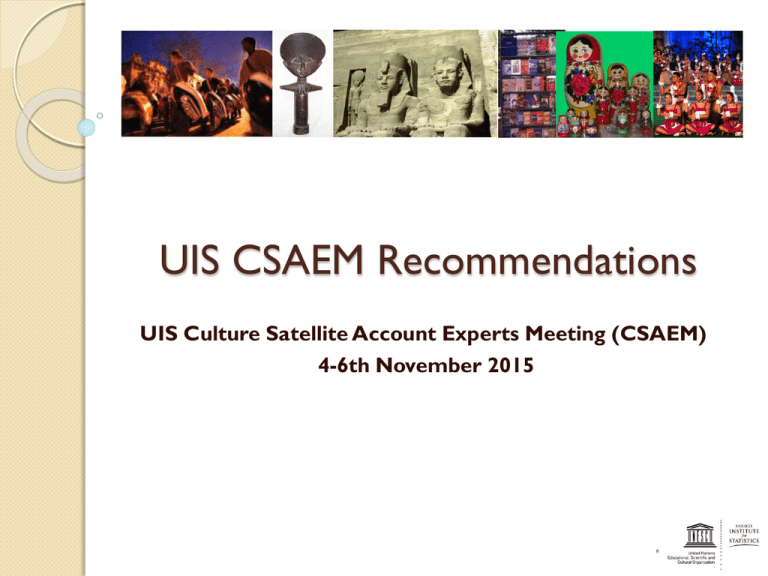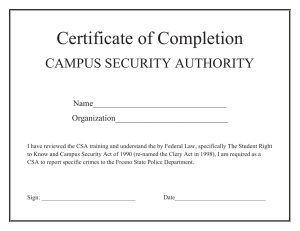UIS CSAEM Recommendations UIS Culture Satellite Account Experts Meeting (CSAEM)
advertisement

UIS CSAEM Recommendations UIS Culture Satellite Account Experts Meeting (CSAEM) 4-6th November 2015 Purpose of the CSA Need to consider why the CSA is being developed What are we trying to measure? Target audience: policy makers, statisticians, academics, culture associations Marketing tool: need to design an excellent communication tool Explain scope and limitations of CSA Explain how to use the results of the CSA Include minimum requirements before undertaking CSA Initial step is to develop national cultural statistics Lessons learnt from national and regional experience CSA ◦ Need to take into account the different statistical capacity of countries ◦ Country experiences: CSA built from existent SNA with some adjustments (CAN, AUS, FIN) ◦ Latin America CAB: SNA not accurate enough. CAB Methodology developed outside Objective to improve SNA ◦ In Africa, SNA not correctly compiled and poor quality Proposal for the CSA’ scope ◦ Definition culture for CSA: “from an economic operative perspective” purpose ◦ Core 2009 UNESCO FCS cultural domains Excluded Tourism: cultural tourism are captured in some domains Sports: deserve a separate account or modular approach like CAN Clear definitions of 2009 FCS Sub domains Define how to deal with transversal domains Challenging domains: valuation issue Tangible Heritage Intangible Heritage Handicraft Festivals Require different types of measure As non monetary indicators Initial Methodology Need to identify core tables ◦ Production/output tables ◦ Supply/use ◦ Employment Use of the Trident Approach Volunteer work ◦ Gross Fixed Capital Formation ◦ Imports and exports of cultural goods ◦ Imports and exports of cultural services Measures GDP and value added for policy purpose: countries need be compared to each other However important to go beyond GDP measures to include: ◦ Demand side: national cultural expenditure ◦ Non monetary indictors Cultural practices Identify minimum list of non monetary indicators Areas of investigation Demand side Extended concepts ◦ Externalities : maybe consider only as non monetary indicators? Points to consider ◦ Digitalization process: streaming etc., youtube ◦ OECD/WTO Trade in value added project ◦ Foreign Affiliate Statistics Data sources SNA Administrative data Business registers Cultural consumption survey Cultural participation survey Household expenditure survey Taxes Time use surveys Other satellite accounts Visitor survey New forms ◦ Electronic transactions ◦ Big data : example: The billion prize project Choice of classifications Type of measures Names of classifications Economic Classifications Production: International Standard Industrial Classification (ISIC 4) Production Central Product Classification Version 2 Trade Goods: Harmonized Commodity Description and Coding System (HS) Services: Extended Balance of Payments (EBOPS) Employment International Standard Classification of Occupations (ISCO 08) Social International Classification of Activities for Time-Use (ICATUS) Government Classification of the Functions of Government COICOP Classification of Individual Consumption by Purpose COPNI Classification of the Purposes of Non-profit Institutions Others? Classifications UIS will continue participating in classification revision process to improve culture visibility COICOP, ICATUS under revision CPC: soon: meanwhile new guidelines will be published ISCO ? Allocation factors Need to define allocation factors For which purposes? ◦ Excluding non cultural element Building from previous experiences CAB Manual TSA National experiences Other Satellite accounts ◦ Non profit institution ◦ ? Other points to be considered ? Thank you!


